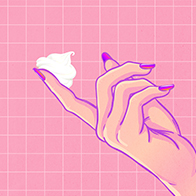Help! My Vagina Keeps Pushing My Partner Out

So, let's say I have this "friend." And this friend is dealing with a very peculiar problem: Toward the end of each of her romantic liaisons, right when the gettin's good, she tends to clench in a way that exerts significant resistance against penetration.
Occasionally, it's so strong, her partner's penis (or fingers, toy, what have you) is expelled. It can be a little embarrassing, sure, but more frustrating than anything (I would imagine). Orgasm denial enthusiasts notwithstanding, who wants things to immediately shut down just when they're on the cusp of coming?
Usually, it's not a huge inconvenience—my friend just has to reinsert whatever was in her vagina and continue, albeit with a more conscious effort to keep everything down there relaxed. But other times, it just keeps popping out over and over again, like an X-rated Three Stooges skit.
Over the years, she's been too sheepish to bring it up to anybody, but this hasn't stopped her from wondering whether or not there's a fix or at least an explanation for what's going on.
Being the magnanimous person that I am, I decided to talk to a medical professional to get to the bottom of the issue once and for all. Yes, I'm that much of a friend.
Sometimes, no cause for concern
Peace Nwegbo-Banks, M.D., FACOG, a board-certified OB-GYN at Serenity Women's Health & Med Spa, says this probably isn't cause for concern as long as there are no other concurrent symptoms in the pelvic region.
"In a situation where there's no pathology, that individual just has strong pelvic floor muscles that naturally contract during orgasm," Nwegbo-Banks said. "Round of applause for that."
In this case, she added, the best thing to do is put the penetrating appendage or item back in and carry on as before. If it happens repeatedly, you may want to try a different position and attempt to relax your muscles. Another solution may be to use lube.
"It sounds counterintuitive—you might think with extra lubrication, it would be easier to slip out," Nwegbo-Banks said. "But lubrication can help you feel a bit more relaxed, and results in less tension with the penetrative force."
But a so-called pushy vagina isn't always a sign of below-the-belt super-strength.
Indicators of underlying problems
"If the patient has chronic constipation, pelvic pain or pain during intercourse, or incontinence issues, they may have a little bit of pelvic floor dysfunction," Nwegbo-Banks added.
This can be caused by things like childbirth, an injury or even lifting heavy weights the wrong way.
"The typical treatment for that is pelvic floor physical therapy," Nwegbo-Banks continued. "Such therapy involves a trained specialist assessing the strength of your pelvic floor muscles and using various therapies like exercises, probes and manual massaging to alleviate a patient's symptoms, usually over the course of several months."
The good news, according to Nwegbo-Banks, is that "physical therapy is one of the best adjuncts that [OB-GYNs] have available in our armamentarium."
"It is highly successful," Nwegbo-Banks added. "I've had very few patients say it did not help them. Physical therapists are well-trained, highly qualified and do excellent work. They really take their time to identify the issues and help patients."
The bottom line
If you're anything like me—uh, my friend—whose only complaint is occasionally forcing something out of their vagina when clenching, you probably just have buff pelvic floor muscles. Between reinsertion, relaxation, switching positions and lubrication, it shouldn't interfere too much with your sex life.
But if you're experiencing pain, constipation, incontinence or other pelvic-floor-related symptoms, it could be something more, and it's worth getting checked out.
"Patients should know that having a bowel movement, intercourse or urinating should all be pleasurable, or provide relief," Nwegbo-Banks said. "It's important to make sure that they're living their best life."




















